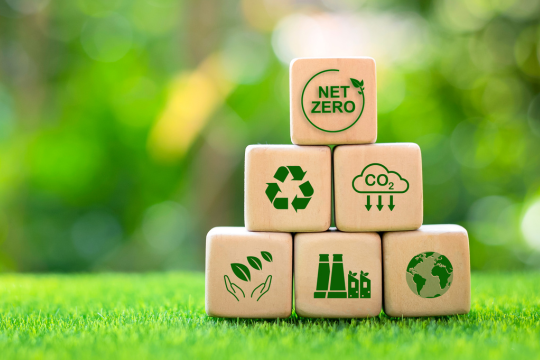Communicating sustainability is one of the most important tools for companies to communicate their commitment to sustainability to the public and make it visible. It is not for nothing that the saying goes "Do good and talk about it".
A common term that is often used in connection with communicating commitment is "climate neutral". Deutsche Umwelthilfe defines the term as follows: "Climate neutral [means] first of all that the product or service does not increase the amount of climate-damaging gases in the atmosphere" ¹. So that's a positive thing in itself.
Problem: Only three percent of consumers know what "climate neutral" means
However, it is often not clear how climate neutrality was achieved. The term implies that a company has no impact on the climate, in particular no CO₂ emissions. However, without offsetting, it is almost impossible to completely avoid one's own emissions. This is also made clear by the European Parliament in its definition of "climate neutral": "Climate neutrality means achieving a balance between carbon emissions and the absorption of carbon from the atmosphere into carbon sinks. To achieve net-zero emissions, all greenhouse gas emissions worldwide must be offset by carbon sequestration"², which is often achieved through certificates and thus the promotion of climate protection projects. The problem is that the majority of consumers are not aware of this approach.
Organizationstake legal action against the use of "climate neutral
In recent years, the use of the term "climate neutral" has therefore led to legal challenges for some companies. Isolated companies have been sued for misleading advertising, misinformation and thus deceiving consumers. The path for real climate protection is being hampered by false claims. ⁴
In addition, climate neutrality through offsetting alone is not a solution. Climate change is a complex and multi-layered problem that goes beyond mere offsetting. It requires comprehensive adaptation measures, such as the promotion of renewable energies, sustainable resource use and the restoration of biodiversity. "Climate neutrality" focuses solely on avoiding emissions, which is usually achieved through the purchase of CO₂ certificates.
EUplans to ban "climate neutral
The European Union is also planning to take action against false environmental claims. With the EU Green Claims Directive, the Commission is submitting an initial proposal to create fair conditions for companies that are honestly committed to a more sustainable future. The directive also affects the term "climate neutral", the use of which is to be banned for corporate advertising purposes. This is currently presenting many companies with major challenges and they are looking for alternatives to "climate neutral".
What are alternatives to "climate neutral"?
With Planted, we are therefore coining the term "climate active," which according to the Duden dictionary is defined as follows: "working to protect the planet, well suited to do so" ⁵. Climate activity thus describes a wide range of measures that a company can take to consciously assume responsibility for its own actions and the effects on the climate.
Climate action thus goes beyond the mere climate neutrality of a company and offers a good alternative: after carbon accounting, a company not only offsets CO₂, but also actively contributes to reducing CO₂ emissions through various solutions. The focus is on avoiding and actively reducing (internal) emissions in all areas of the company.
Offsetting is part of climate action and remains an important part of corporate sustainability strategy with the compensation of unavoidable emissions through the promotion of global, certified climate protection projects - as long as they are not yet in a position to completely avoid or reduce company emissions.
Protecting and preserving ecosystems: more than "climate neutral"
In addition to managing emissions, companies should also become climate active by actively protecting ecosystems, which play an important role in the fight against the climate crisis. Intact ecosystems such as forests, oceans or wetlands contribute to the absorption of CO2 and regulate the climate. By protecting and restoring these ecosystems, companies can help reduce the greenhouse gas effect and build resilience to the impacts of climate change. In addition, protected ecosystems help maintain biodiversity, the water cycle, and other important ecosystem services that are critical to the well-being of people and nature.
Become climate-active with the all-in-one sustainability platform
With Planted, we support your company holistically with GHG-based data collection, CO₂ balancing and reduction through to CSRD-compliant reporting. In addition, we provide advice on transparent communication with an alternative to "climate neutral" and also enable you to protect biodiversity by planting trees in Germany. Book a no-obligation demo of our software solution today.
Sources:
¹ Climate neutral - what does that actually mean? - Deutsche Umwelthilfe e.V. (duh.de)
² What is climate neutrality? | News | European Parliament (europa.eu)
⁵ klimaaktiv ᐅ spelling, meaning, definition, origin | Duden





